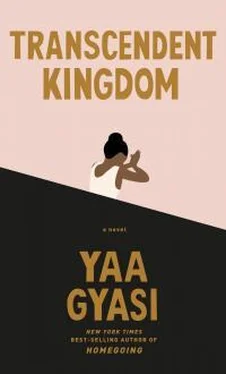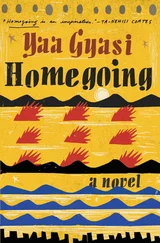One night, my mother found me resting in that recliner. I looked up from the television and she was standing there. It was a wonder to me how sometimes she could move so quietly it was like she was incorporeal.
“What are you doing down here?” she asked.
Nana had been dead four years. It had been three and a half years since my summer in Ghana, a month of bad dreams. In that time, I had promised myself I wouldn’t ever burden her, that all she would ever get from me was goodness and peace, calm and respect, but still, I said, “Sometimes I talk to Nana when I can’t sleep.”
She sat down on the couch, and I watched her face intently, worried that I’d said too much, that I’d broken our little code, my private promise.
“Oh, I talk to Nana too,” she said. “All the time. All the time.”
I could feel the tears start to well up in my eyes. I asked, “Does he talk back?”
My mother closed her eyes and leaned back into the couch, letting the cushions absorb her. “Yes, I think so.”
—
The night before she was to take the MCAT, I finally told Anne that Nana had died of an overdose.
“Oh God, Gifty,” she said. “Oh shit, I’m so sorry. All that shit I said, I’m so sorry.”
We spent the rest of the night huddled together in my twin extra-long bed. As the evening grew quiet and dark, I listened to Anne cry. Her body-wracking sobs seemed overly dramatic to me that night, and I waited for her to quiet down and fall asleep. When she finally did, I lay there fuming, wondering, What does she know? What does she know about pain, the dark and endless tunnel of it? And I felt my body stiffen, and I felt my heart harden, and I never spoke to her again. She sent me text messages the next day, after she came out of the exam.
“Can I come over and see you? I’ll bring a pint of ice cream and we can veg out.”
“I’m still so sorry about last night. I shouldn’t have made you talk about it before you were ready.”
“Hello? Gifty? I get it if you’re mad at me, but can we talk?”
The texts came steadily for two weeks, and then silence. Anne graduated, summer came, I went home to Alabama to wait tables so that I could save up some money before I had to go back to school. The next year I started over again, down a friend. I threw myself into my work. I interviewed at labs all across the country. I hadn’t prayed in years, but sometimes, before bed, when I missed Anne, I talked to Nana.
50
My mother was awake and sitting up in bed the day after I prepped the limping mouse for optogenetics.
“Hey,” I said. “Do you want to go out today? We can get breakfast somewhere. Would you like that?”
She smiled at me a little bit. “Just water,” she said, “and a granola bar, if you have it.”
“Sure, I have a bunch. Let me see.” I rushed over to the kitchen pantry and pulled out a big selection. “Pick one,” I said.
She took the peanut-butter-chocolate-chip one and nodded at me. She sipped the water.
“I can stay home with you today, if you’d like. I don’t have to go in, really.” This was a lie. If I didn’t go in I would ruin a week or more of work and have to start all over, but I didn’t want to miss my chance. I felt like my mother was my own personal groundhog. Would she see her shadow? Had winter ended?
“You go,” she said. “Go.”
She slipped back down under the covers, and I closed the door, rushed out to my car, simultaneously saddened and relieved.
—
At the lab, there was cause for celebration. Han had gotten his first paper published in Nature. He was first author on that paper and I knew that his postdoc would be coming to an end before long. I was already starting to miss him. I bought a cupcake from the shop on campus and brought it to Han at his desk, lighting the single candle in the middle and singing an odd-patchwork version of “Happy Birthday” with the words changed to “Congratulations, Han.”
“You didn’t have to do this,” he said, blowing out the candle. His ears were red again, and I was pleased to see that familiar hue, wistful that it had gone away in the first place. The cost of getting closer to Han had been fewer instances of this strange and delightful trait.
“Are you kidding? I might need you to hire me soon.”
“Says the woman with two papers in Nature and one in Cell. I’m just trying to catch up.”
I laughed him off and got to work. I had wanted to be in this lab because of its meticulousness, because of the fact that every result had to be tested and then tested again. But there was a point when confirmation became procrastination, and I knew that I was nearing that point; maybe I had passed it. Han was right. I was good at my work. Good at my work and hungry to be better, to be the best. I wanted my own lab at an elite university. I wanted a profile in The New Yorker, invitations to speak at conferences, and money. Though academia wasn’t the right route for making loads of money, I still dreamed of it. I wanted to dive into a pile of it every morning like Scrooge from DuckTales, the TV show Nana and I used to watch when we were young and money was scarce. And so, I tested and tested again.
Anne used to call me a control freak. She said it teasingly, lovingly, but I knew that she meant it and I knew it was true. I wanted things just so. I wanted to tell my stories the way I wanted to tell them, in my own time, imposing a kind of order that didn’t actually exist in the moment. The last text Anne ever sent to me said, “I love you. You know that right?” and it took everything I had not to respond, but I gave it everything I had. I took pleasure in my restraint, a sick pleasure that felt like a hangover, like surviving an avalanche only to lose your limbs to frostbite. That restraint, that control at any cost, made me horrible at a lot of things, but it made me brilliant at my work.
I returned to my lever-press experiment. I was using both opsins and fluorescent proteins that allowed me to record brain activity so that I could see which specific prefrontal cortex neurons were active during the foot-shocks. The fluorescent proteins were something of a marvel. Whenever I shone blue light on the protein, it would glow green in the neuron that expressed it. The intensity of that green changed based on whether or not the neuron was firing or inactive. I never tired of this process, the holiness of it, of shining light and getting light in return. The first time I ever saw it happen, I wanted to call everyone in the building to gather round. In my lab, this sanctuary, something divine. Light is sweet and it pleases the eye to see the sun.
Now I’ve seen it so many times, my eyes have adjusted. I can’t go back to that initial state of wonder, so I work, not to recapture it, but to break through it.
“Hey, Gifty, do you want to get dinner with me sometime? I mean, it was nice to share that Ensure and all, but maybe we can get a real meal this time.”
Han had gloves and safety goggles on. He was watching me warmly, hopefully, his ears glowing faintly red.
I wished just then that I had a glow of my own, a bright green fluorescent shimmer under the skin of my wrist that flashed in warning. “I’m horrible at relationships,” I said.
“Okay, but how are you at eating dinner?” he asked.
I laughed. “Better,” I said, though that wasn’t quite true either. I thought about the dinner parties with Raymond five years before, the excuses I’d made to get out of them, the fights we’d had.
“You spend more time with lab mice than you do with people. You know that’s not healthy, right?” he said.
I didn’t know how to explain to him that spending time in my lab was still a way for me to spend time with people. Not with them, exactly, but thinking about them, with them on the level of the mind, which felt as intimate to me as any dinner or night out having drinks had ever felt. It wasn’t healthy, but, in the abstract, it was the pursuit of health, and didn’t that count for something?
Читать дальше












